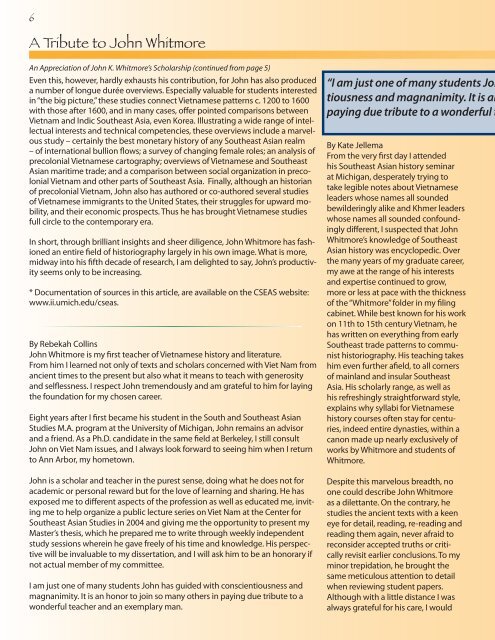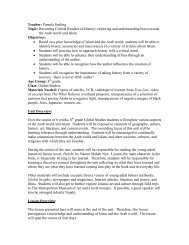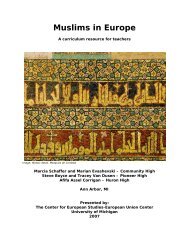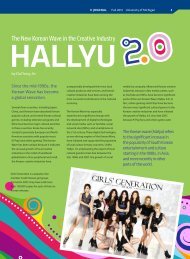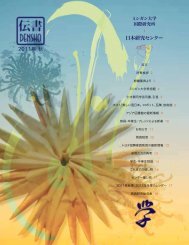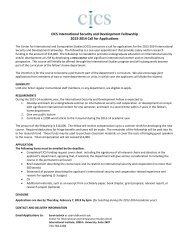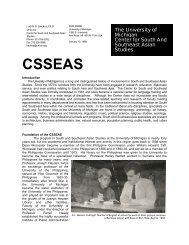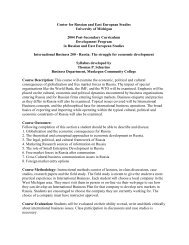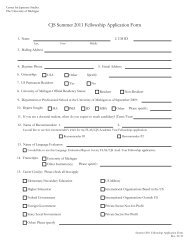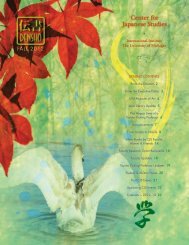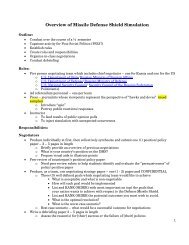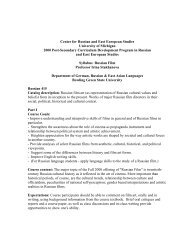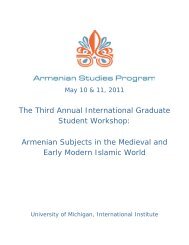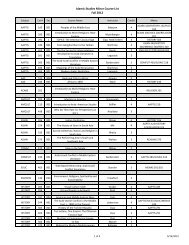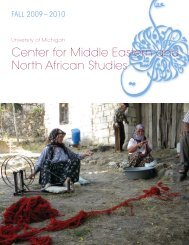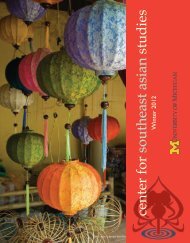Center for Southeast Asian Studies - International Institute ...
Center for Southeast Asian Studies - International Institute ...
Center for Southeast Asian Studies - International Institute ...
You also want an ePaper? Increase the reach of your titles
YUMPU automatically turns print PDFs into web optimized ePapers that Google loves.
6<br />
A Tribute to John Whitmore<br />
An Appreciation of John K. Whitmore’s Scholarship (continued from page 5)<br />
Even this, however, hardly exhausts his contribution, <strong>for</strong> John has also produced<br />
a number of longue durée overviews. Especially valuable <strong>for</strong> students interested<br />
in “the big picture,” these studies connect Vietnamese patterns c. 1200 to 1600<br />
with those after 1600, and in many cases, offer pointed comparisons between<br />
Vietnam and Indic <strong>Southeast</strong> Asia, even Korea. Illustrating a wide range of intellectual<br />
interests and technical competencies, these overviews include a marvelous<br />
study – certainly the best monetary history of any <strong>Southeast</strong> <strong>Asian</strong> realm<br />
– of international bullion flows; a survey of changing female roles; an analysis of<br />
precolonial Vietnamese cartography; overviews of Vietnamese and <strong>Southeast</strong><br />
<strong>Asian</strong> maritime trade; and a comparison between social organization in precolonial<br />
Vietnam and other parts of <strong>Southeast</strong> Asia. Finally, although an historian<br />
of precolonial Vietnam, John also has authored or co-authored several studies<br />
of Vietnamese immigrants to the United States, their struggles <strong>for</strong> upward mobility,<br />
and their economic prospects. Thus he has brought Vietnamese studies<br />
full circle to the contemporary era.<br />
In short, through brilliant insights and sheer diligence, John Whitmore has fashioned<br />
an entire field of historiography largely in his own image. What is more,<br />
midway into his fifth decade of research, I am delighted to say, John’s productivity<br />
seems only to be increasing.<br />
* Documentation of sources in this article, are available on the CSEAS website:<br />
www.ii.umich.edu/cseas.<br />
By Rebekah Collins<br />
John Whitmore is my first teacher of Vietnamese history and literature.<br />
From him I learned not only of texts and scholars concerned with Viet Nam from<br />
ancient times to the present but also what it means to teach with generosity<br />
and selflessness. I respect John tremendously and am grateful to him <strong>for</strong> laying<br />
the foundation <strong>for</strong> my chosen career.<br />
Eight years after I first became his student in the South and <strong>Southeast</strong> <strong>Asian</strong><br />
<strong>Studies</strong> M.A. program at the University of Michigan, John remains an advisor<br />
and a friend. As a Ph.D. candidate in the same field at Berkeley, I still consult<br />
John on Viet Nam issues, and I always look <strong>for</strong>ward to seeing him when I return<br />
to Ann Arbor, my hometown.<br />
John is a scholar and teacher in the purest sense, doing what he does not <strong>for</strong><br />
academic or personal reward but <strong>for</strong> the love of learning and sharing. He has<br />
exposed me to different aspects of the profession as well as educated me, inviting<br />
me to help organize a public lecture series on Viet Nam at the <strong>Center</strong> <strong>for</strong><br />
<strong>Southeast</strong> <strong>Asian</strong> <strong>Studies</strong> in 2004 and giving me the opportunity to present my<br />
Master’s thesis, which he prepared me to write through weekly independent<br />
study sessions wherein he gave freely of his time and knowledge. His perspective<br />
will be invaluable to my dissertation, and I will ask him to be an honorary if<br />
not actual member of my committee.<br />
I am just one of many students John has guided with conscientiousness and<br />
magnanimity. It is an honor to join so many others in paying due tribute to a<br />
wonderful teacher and an exemplary man.<br />
“I am just one of many students Joh<br />
tiousness and magnanimity. It is an<br />
paying due tribute to a wonderful t<br />
By Kate Jellema<br />
From the very first day I attended<br />
his <strong>Southeast</strong> <strong>Asian</strong> history seminar<br />
at Michigan, desperately trying to<br />
take legible notes about Vietnamese<br />
leaders whose names all sounded<br />
bewilderingly alike and Khmer leaders<br />
whose names all sounded confoundingly<br />
different, I suspected that John<br />
Whitmore’s knowledge of <strong>Southeast</strong><br />
<strong>Asian</strong> history was encyclopedic. Over<br />
the many years of my graduate career,<br />
my awe at the range of his interests<br />
and expertise continued to grow,<br />
more or less at pace with the thickness<br />
of the “Whitmore” folder in my filing<br />
cabinet. While best known <strong>for</strong> his work<br />
on 11th to 15th century Vietnam, he<br />
has written on everything from early<br />
<strong>Southeast</strong> trade patterns to communist<br />
historiography. His teaching takes<br />
him even further afield, to all corners<br />
of mainland and insular <strong>Southeast</strong><br />
Asia. His scholarly range, as well as<br />
his refreshingly straight<strong>for</strong>ward style,<br />
explains why syllabi <strong>for</strong> Vietnamese<br />
history courses often stay <strong>for</strong> centuries,<br />
indeed entire dynasties, within a<br />
canon made up nearly exclusively of<br />
works by Whitmore and students of<br />
Whitmore.<br />
Despite this marvelous breadth, no<br />
one could describe John Whitmore<br />
as a dilettante. On the contrary, he<br />
studies the ancient texts with a keen<br />
eye <strong>for</strong> detail, reading, re-reading and<br />
reading them again, never afraid to<br />
reconsider accepted truths or critically<br />
revisit earlier conclusions. To my<br />
minor trepidation, he brought the<br />
same meticulous attention to detail<br />
when reviewing student papers.<br />
Although with a little distance I was<br />
always grateful <strong>for</strong> his care, I would


